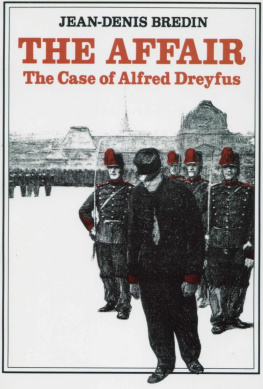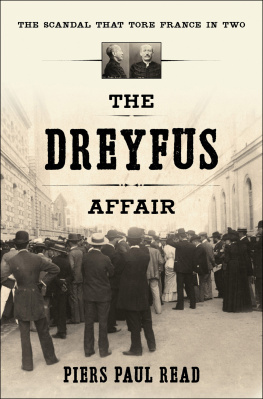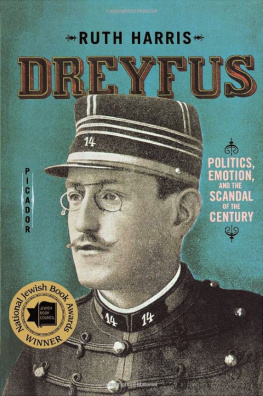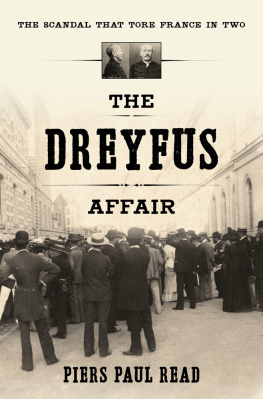Guy Chapman
The Dreyfus Trials

This electronic edition published in 2011 by Bloomsbury Reader
Bloomsbury Reader is a division of Bloomsbury Publishing Plc, 50 Bedford Square, London
WC1B 3DP
Copyright Guy Chapman 1972
First published by B. T. Batsford Ltd 1972
The moral right of author has been asserted
All rights reserved
You may not copy, distribute, transmit, reproduce or otherwise make available this publication
(or any part of it) in any form, or by any means (including without limitation electronic, digital,
optical, mechanical, photocopying, printing, recording or otherwise), without the prior written
permission of the publisher. Any person who does any unauthorised act in relation to this
publication may be liable to criminal prosecution and civil claims for damages
ISBN: 9781448205875
eISBN: 9781448205561
Visit www.bloomsburyreader.com to find out more about our authors and their books
You will find extracts, author interviews, author events and you can sign up for
newsletters to be the first to hear about our latest releases and special offers
The Dreyfus case is the classic case of miscarriage of justice: after fifty years we are only just coming to a full understanding of the triviality, the prejudice, the casual cruelty and the clannishness which sent a wholly innocent man to isolation on a bare Caribbean rock, kept him there for five years, and with a lack of scruple and a tenacity worthy of a better cause checked every move to re-open the case. The complications born of the sheer mass of evidence, genuine and invented, and of the equal mass of involuntary error and hard lying, are partly responsible for the fact that over a course of more than half a century minor details of this extraordinary case are still surfacing. Although a great measure of the heat engendered between 1894 and 1902 has evaporated, the passions of the past smoulder: there survive fanatical partisans of the original accusation, and infrequent vendors of new theories. The affair is unique in that a reference to it can still throw defenders of the raison dtat on to the defensive. It involved all the rival theories of the state, it disturbed profoundly the whole of France, and stirred sympathy in many other countries. The trouble from the beginning lay in the nature of the case itself. It affected not only the Army, it influenced powerfully the religious framework and organization. It involved the other great organs of state, the Government, Parliament, and the Judiciary. It appealed in particular to the literate public, resulting in a tumult of the intellectuals not yet entirely appeased. It cut across political affiliations, exacerbated personal loyalties and divided families.
In 1955 I published The Dreyfus Case: A Reassessment, an account based, so far as I then knew or could discover, on all the existing evidence, and on the contemporary political and social background. A year or so later, Messrs Plon published in Paris the Journal de IAffaire Dreyfus by the late Maurice Palologue, selected from the diaries he had kept during the heroic period of the case, before the suicide of Henry. Some critics believed he had manipulated them, but no one could be sure: there is, I think, no doubt that he had edited certain of the entries later. Apart from an entry, ostensibly of January 1899, in which he offers what he calls a constructive hypothesis that there were in fact three villains, Maurice Weil, Esterhazy, and a very high-ranking officer On whom no suspicion has yet fallen, the book raises no serious issues.
In 1961 there appeared LAffaire sans Dreyfus, by M. Marcel Thomas, an acute and painstaking archivist. It revealed that many papers to do with the case, which I and others believed to have been destroyed, partly in September 1914 at the time of the Marne fighting and the threat to Paris, partly at the time of the collapse in June 1940, had in fact been preserved. They include the mass of documents accumulated and commented by General Gonse in 1898, and examined by the then Captain Cuignet, the first person to notice that the faux Henry was not a genuine document. M. Thomass examination of these papers put beyond doubt the complicity of General Gonse, Major Lauth, and Staff-Sergeant Gribelin, in the whole complicated web of Henrys activities. He was also able to examine the private papers of the luckless du Paty, which reveal with great clearness how callously he was used by both Gonse and Henry.
Further search turned up, in the Historical Section of the Army at Vincennes, the original pieces composing the secret dossier of the court-martial. Less important papers, discovered in the Bibliothque Nationale, include the legacy of Esterhazys letters left by the late Paul Desachy, compiler of the collection of documents of the case published about 1900 under the title of Repertoire de IAffaire Dreyfus.
Various writers succeeded M. Thomas. None is of importance, but one might mention Madame Dardenne-Cavaignacs recent account of the case based on her fathers papers, with the assistance of Lt-Col. Cuignet.
A book published in 1962 has a special interest. This is Lnigme Esterhazy, by Henri Guillemin. M. Guillemin is or was the cultural attach at Berne. He has been described by a reviewer in the Times Literary Supplement as the enfant terrible of French historiography. The book develops at length, with wit and intellect, the thesis that every previous investigator, including M. Thomas, has been misled or has misled himself, and that the real villain was Maurice Weil, in association with Saussier, the Military Governor of Paris, and his mistress, Weils wife, an Austrian. He draws attention to the fact that at the end of 1897 Picquart was treated harshly by Saussier and Esterhazy with courtesy, but offers no evidence to support any conclusion as to Saussiers serious views. He concludes with the nonchalant confession that the whole argument is a reverie, on which he does not, he says, insist.
After the publication of my book in 1955, Mr J. G. Wilson, of Messrs Bumpus, the London bookseller, allowed me to examine letters Esterhazy wrote after his flight to London in 1898. He had received them from the widow of the well-known publisher Grant Richards. Most of them were addressed to Esterhazys lawyers and to Grant Richards, and related to his efforts to sell the world rights of his memoirs. Unhappily he had already disposed of the Dessous de l Affaire Dreyfus to a French publisher, Fayard, and after a considerable amount of ill-tempered argument the correspondence ceased. It throws no light on the case. One small fact of interest emerged in that Esterhazy had already adopted the name of de Voilement which is inscribed on his tomb at Harpenden. And he seems to have squeezed 1,000 out of Grant Richards.
I should add that, of the vast number of contemporary publications on behalf of or opposed to Dreyfus, one only, Joseph Reinachs Histoire de lAffaire Dreyfus, six volumes, seven with the volume of index and corrections, is significant and indispensable. He was an ardent Dreyfusist, in the thick of the battle from the moment he became involved in 1895. Naturally, since he was writing almost day by day, he makes errors, but they do not diminish the supreme importance of his record, and the errors are on the whole minor.
Readers will notice that I have used the words Dreyfusist and Dreyfusard. The first distinguishes those who almost from the beginning suspected a judicial error and attempted to secure a re-opening of the case by legal methods, long before it was brought into the political field. The word Dreyfusard, which was coined by the opponents of revision as a term of opprobrium, I have reserved for those who saw in the case an opportunity for political or personal advantage, the late-comers whom Pguy stigmatized as profiteers.
Next page











